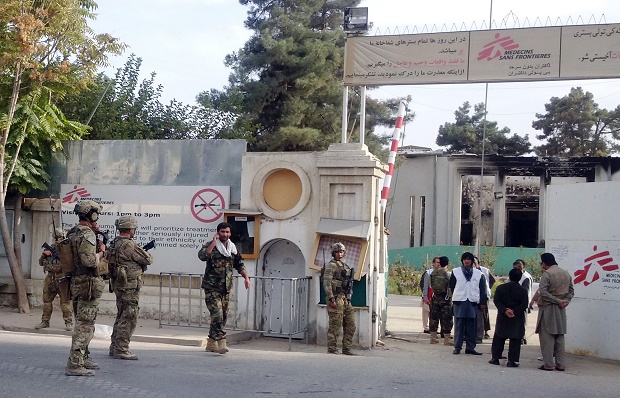US troop extension hands Afghanistan a lifeline—for now

U.S. soldiers walk into the charred remains of the Doctors Without Borders hospital in Kunduz, Afghanistan, Thursday, Oct. 15, 2015. The attack, which killed a number of hospital staff and patients, was intended to back up Afghan forces fighting to dislodge Taliban insurgents who overran the strategic city earlier in the month. AP
KABUL, Afghanistan—The United States’ decision to extend its military presence in Afghanistan beyond 2016 has thrown the war-ravaged country’s government a much needed lifeline even as its dysfunctionality, blamed for the Taliban’s revival, shows no signs of abating.
READ: US military favors keeping troops in Afghanistan past 2016
It has been just over a year since Ashraf Ghani was sworn in as president as part of a US-brokered unity government with his main election rival, former anti-Soviet fighter Abdullah Abdullah, as chief executive.
While the deal was hailed as a breakthrough that had averted a possible ethnic civil war, experts blame the political deadlock it created for allowing the Taliban to regain momentum and unleash a wave of violence not been seen for years.
The insurgents’ seizure of the northern regional capital Kunduz last month, though brief, was a stinging blow to Western-trained Afghan forces as they struggle to maintain security after the end of NATO’s mission in December.
Article continues after this advertisementREAD: Clinton backs Obama’s move to keep US forces in Afghanistan
Article continues after this advertisementUS President Barack Obama’s decision to keep 5,500 troops beyond 2016 has therefore been met with widespread relief by officials and residents, who hope it will prevent the country from becoming a regional hub of terror and violence like Syria.
“The announcement is an important boost to the Afghan army morale, it shows that the world is not leaving them alone,” said retired general Atiqullah Amarkhil.
But few are hopeful it can tilt the balance in favor of government forces, with a protracted stalemate seen as one possible scenario, and rising proxy battles between opposing foreign powers another.
Russian President Vladimir Putin’s announcement this week that his country would create a joint task force with ex-Soviet states to defend against a spillover in Afghan violence has invoked fears of a fresh Russian-US proxy war in addition to the rivalries already being played out between Saudi Arabia and Iran, and India and Pakistan.
‘One truck, two drivers’
“What it is essentially saying is that the Americans and NATO will continue to bankroll the salaries of the Afghan army,” said Ahmed Rashid, a Pakistani author and Afghanistan expert.
“Obama’s statement wasn’t tough enough on the corrupt leadership, which has squandered the opportunities given to it and robbed the country… We’ve seen a year of hopeless governance and there is mounting pressure for a fresh government.”
At the heart of the problem, insiders say, is the unstable power-sharing deal between Ghani and Abdullah—only ever meant to be temporary arrangement before a more permanent solution was fleshed out by the loya jirga (grand assembly) and a fresh constitution.
“When we first proposed a unity government it was to keep everybody on board so we have a united vision for Afghanistan,” said Ahmad Wali Massoud, an ex-ambassador who was close to former president Hamid Karzai.
Instead, he argues, the government has descended into a debilitating factionalism—popularly derided as “one truck, two drivers.”
“There is now a sense that a governor may be Ghani’s pick, the deputy governor is Abdullah’s,” he said.
“That doesn’t work… The disunity is very obvious. The policies and appointments are falling apart.”
Poor intelligence sharing between officials in opposing camps across the country’s 34 provinces has been blamed for the rise in unrest that saw civilian casualties reach a record high in the first half of the year.
The provincial governor of Kunduz, for example, was a Ghani man, while the powerful police chief was Abdullah’s pick—sources close to the matter say there was little coordination between the two.
‘Losing our country’
Massoud, who supported Abdullah last year but prefers to remain neutral now, said he chaired an informal meeting of advisors to the two camps at his home this week.
“They told me, we never discuss the issues inside the government. This is the first time we are thrashing them out.”
Beyond the security crisis, the political deadlock has hampered progress on a host of other fronts key to stabilising the country—including appointing essential posts such as defence minister.
“They have not carried out any of key reforms promised including parliamentary elections, the appointment of a cabinet, a fresh loya jirga and the writing of a new constitution. None of this has happened,” said Rashid.
Ghani’s poor track record has seen him suffer a spectacular fall from grace.
From riding high at 60 percent approval ratings, according to polling by Afghan media outlet Tolo News, by August, he and and Abdullah were languishing around 20 percent.
Bibi Huma, a 43-year-old Kunduz resident currently in Kabul where she attends a protest camp every day, said she had lost all faith in her country’s leaders.
“Since Karzai left office things have been getting worse. We made a mistake to vote for these two,” she said.
“Our sons are jobless, our police aren’t being paid.
“We are losing our country.”